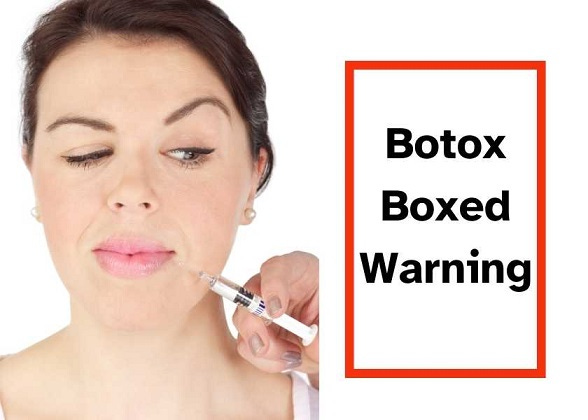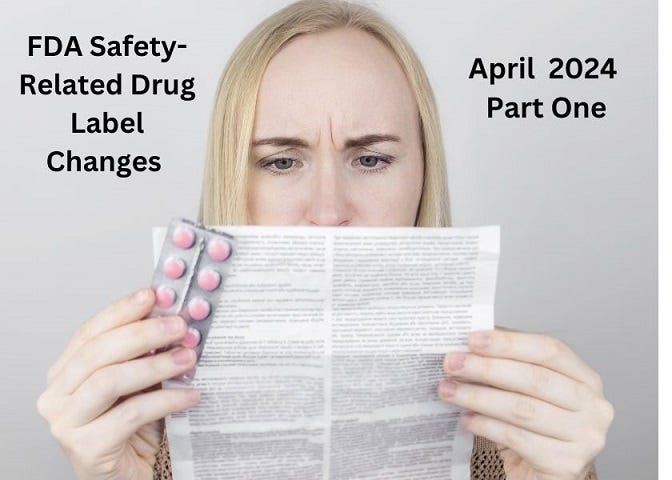Drug Safety Updates: April 2024
Safety-related label changes at FDA for atorvastatin, iloperidone, tipranavir, allopurinol, ticagrelor; plus safety concerns about Botox and some lidocaine products.
Drug Safety Labeling Updates
Cholesterol drug Lipitor (atorvastatin calcium) had its label updated to include the rare risk of new-onset or exacerbation of myasthenia gravis, including ocular myasthenia, and reports of recurrence when the same or a different statin was administered. Also, the instructions for the "missed dosage" section was updated: patients are advised if they miss a dose, they should NOT take the missed dose and instead resume with the next scheduled dose.
https://www.accessdata.fda.gov/scripts/cder/safetylabelingchanges/index.cfm?event=searchdetail.page&DrugNameID=1117
Patient reviews of Lipitor at Ask a Patient
Schizophrenia drug Fanapt (iloperidone) had a safety label update to report that in clinical trials, elevated plasma prolactin levels were observed compared with placebo. Additional new warnings included the risk of priapism (persistent erection) and risk of Intraoperative Floppy Iris Syndrome (IFIS) (small pupil syndrome). This eye side effect can interfere with cataract surgery. More changes were made to the label based on results of a clinical trial. Fanapt was originally approved in 2009 and with this label update is also approved to treat bipolar disorder.
https://www.accessdata.fda.gov/scripts/cder/safetylabelingchanges/index.cfm?event=searchdetail.page&DrugNameID=9
Patient reviews for Fanapt at Ask a Patient
HIV drug Aptivus (tipranavir) had its safety label changed to add a section on the importance of co-administering the drug with food and ritonavir to obtain the desired antiviral effect.
https://www.accessdata.fda.gov/scripts/cder/safetylabelingchanges/index.cfm?event=searchdetail.page&DrugNameID=413
Gout drug allopurinol had a safety label change to warn about the risk of skin rash and hypersensitivity and systemic allergic symptoms (DRESS).
https://www.accessdata.fda.gov/scripts/cder/safetylabelingchanges/index.cfm?event=searchdetail.page&DrugNameID=2938
Patient reviews for allopurinol at Ask a Patient
Blood thinner drug Brilinta (ticagrelor) drug label was updated with more specific information about the daily maintenance doses of aspirin that should or should not be taken with it, depending on why the patient is taking the drug.
https://www.accessdata.fda.gov/drugsatfda_docs/label/2024/022433s035lbl.pdf
Patient reviews for Brilinta at Ask a Patient
FDA Safety Warnings Letters
The U.S. FDA warned that some popular pain-relief creams, often used after laser hair removal or microdermabrasion treatments, contain high levels (more than 4%) of lidocaine and may pose dangerous health risks. The FDA issued warning letters to six companies for violating federal laws by “marketing unapproved, misbranded products” with higher-than-allowed concentrations of lidocaine.
https://www.fda.gov/news-events/press-announcements/fda-warns-consumers-avoid-certain-topical-pain-relief-products-due-potential-dangerous-health
Botox Safety Concerns
Popular news outlets (including, most recently, the Washington Post) are featuring many articles and videos about the trendy cosmetic prescription medication Botox to combat and even prevent wrinkles. The content portrays onabotulinumtoxin A (Botox, Botox Cosmetic, and recently approved Daxxify) and related botulinum-toxin drugs as safe, and tend to downplay potential side effects.
Very few articles mention that the drug has a black box warning about how the drug can spread from the place where it was injected: "WARNING: DISTANT SPREAD OF TOXIN EFFECT." Consumer watchdog Public Citizen recently sent a petition to the FDA urging that the warning on the labeling of Botox and related drugs be strengthened to make it clear that the drugs are associated with systemic iatrogenic botulism (a "man-made" form of botulism), even when used at recommended doses at the first OR subsequent injections.
Also, they asked to make it clear that iatrogenic botulism requires prompt administration of botulinum antitoxin to avoid disease progression and serious outcomes, including temporary muscle paralysis, hospitalization and death. Their petition discussed several published drug-safety case reports and case series showing that systemic iatrogenic botulism has occurred with recommended doses of botulinum-toxin drugs for various approved uses, including 5,414 reports in the FDA's adverse events database (FAERS) with serious outcomes — such as death, life-threatening events, hospitalization or disability — in which a botulinum-toxin drug was the only primary suspect. In addition, they asked the FDA to remove misleading promotional claims from the labeling of Botox and Botox Cosmetic that minimize the boxed warning risks.
https://www.worstpills.org/newsletters/view/1586 (article is paywalled; abstract available.)
- Patient reviews of Botox Cosmetic on Ask a Patient website
- Current drug label for Botox Cosmetic


